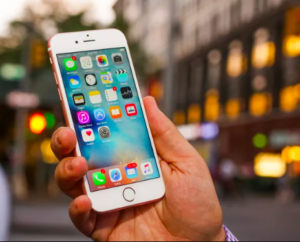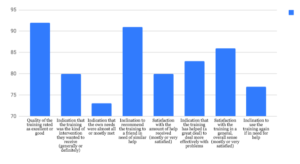College is a busy time for all students, and it is easy to be overwhelmed by the workload given in many college classes. Recently, many college students report an increase in mental health issues, such as depression and anxiety. These mental health issues play a large role in how well students perform in their academics. However, research is being conducted to determine the best course of action. Researchers have conducted studies to evaluate how the best way to alleviate stress. In the study “Effectiveness of an Internet- and App-Based Intervention for College Students With Elevated Stress: Randomized Controlled Trial” 150 participants were tested. The results revealed there is a value in apps and Internet-based intervention methods.

Apps on cell phones are easy to access
In this case, the app that was studied in this case was StudiCare Stress. How the apps works is participants were asked to keep a daily journal. These journals were prompted with the questions: “How do you feel today? (Emoticons: Happy–Sad–Anxious–Angry), How stressed out do you feel today? (Rating scale 1-10), Describe what happened today. (Free text), Were you able to identify any things contributing to your stress levels today? (Free text), Are there any techniques you previously learned that you may be able to apply? (Free text), Do you want to add a photo to your entry? (Upload button)”(Harrer). Along these journals, participants could also complete daily modules that were specifically tailored to the needs of the participants. For example, if a participant was having issues with time management the app would offer lessons on how to plan for studying and homework that fits the individuals’ schedules.
The study found stress levels were moderately to largely reduced in the targeted age group of the study. Those who had mental illnesses, for instance, depression, also noticed a significant change in mental health. However, there was no noticeable change in the areas of self-compassion, perfectionism, resilience, and self-esteem. This particular study resulted in different data than previous studies (Harrer) For instance, more benefits to Internet-based interventions were found in this study. Benefits discovered in this study include the most effective way to reduce stress is to target perceived stress (Harrer). Perceived stress is defined in the Encyclopedia of Behavioral Medicine as “the feelings or thoughts that an individual has about how much stress they are under at a given point in time or over a given time period,”(Phillips). By targeting the individuals’ needs, participants reportedly stated to have less stress and a better mental state. This change in mental health could also lead to better performance in college classes, an investigation worth the study.

Overall app rating by participants
One aspect of the interventions that was widely accepted among the participants what that of the mini-modules. These mini-modules targeted specific issues that college students may have. This allowed the participants to not only have a broad and overarching method of stress relief but also to have a specific intervention for their individual needs. One of the downfalls of the study, mentioned by several of the participants in the study, was that the modules were more of a time commitment than they were expecting or had time for. The modules being the daily logs in the Internet-based intervention methods. However, this raises the question of if the modules were any shorter, what would be lost from the overall effect of the interventions.
However, it is important to mention what this study was not capable of achieving. One of the limitations of this study as noted by the authors is that there was not enough diversity in the participants. There was a noticeable disparity between male and female participants, with females being the majority of participants (Harrer). The study does not mention what race, ethnicity, or sexual orientation the participants with which the participants identify.
Another limitation of this study is that there was a three month follow up with participants to gather more data about the long-term effects of Internet-based interventions. This three month time lead to a large number of dropouts (Harrer). This means that there are gaps in the data collected, however, it was also found that the gaps are not a significant issue in the overall data analysis.
Another factor to keep in mind is that participants were not denied outside intervention methods, for instance seeking therapy. In this way, the effects of co-intervention with the Internet-based intervention and medical services could play a different role in how effective the Internet-based intervention methods are by themselves. One of the other limitations of the study was the way in which data was interpreted (Harrer). It is possible that participants over exaggerated the effectiveness of the Internet-based interventions.
Many college students do not seek help from mental health care providers for fear of being judged by peers. The fact that this intervention method was informal may have attracted participants. Future studies may want to explore how the way we frame mental health care and how to target those who may be adamant about not receiving due to the aforementioned reasons.
The study concludes that internet and mobile-based interventions are effective. They are widely accessible and easy to use a form of reducing stress in college. As an added bonus, the cost of utilizing these methods are very cheap, which may attract more participants (Harrer). The stigma mental illness receives in media may be what makes people hesitant to receive the care they need. It would be beneficial for future studies to examine how professional help and internet-based intervention work together or oppose each other. Another future study should examine the effects of personalized care in Internet-based interventions, and how more or less effective it would be.
If college students feel stressed and need a way to channel that stress, they should try an internet-based intervention. It has been shown in this study to be effective, accessible, and budget-friendly. If students are not already receiving professional medical care, apps similar to StudiCare Stress could be a benefit. Given that stress levels were reduced in this study, it seems likely that Internet-based and app intervention techniques are helpful more than harmful. Students should strongly consider using them as a resource if they do not wish to seek professional help.
Citation:
Harrer, Mathias et al. “Effectiveness of an Internet- and App-Based Intervention for College Students With Elevated Stress: Randomized Controlled Trial.” Ed. Gunther Eysenbach. Journal of Medical Internet Research 20.4 (2018): e136. PMC. Web. 4 Oct. 2018.
Phillips A.C. (2013) Perceived Stress. In: Gellman M.D., Turner J.R. (eds) Encyclopedia of Behavioral Medicine. Springer, New York, NY